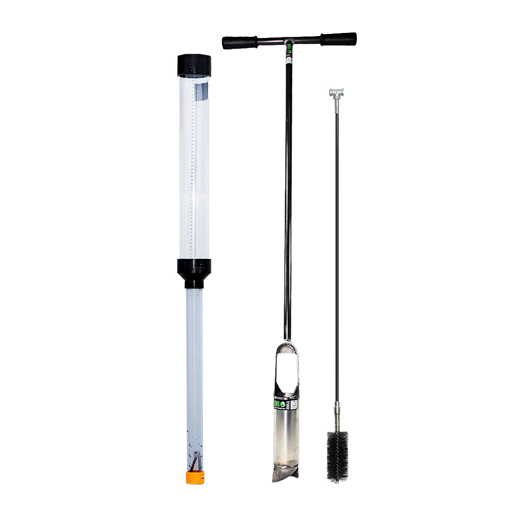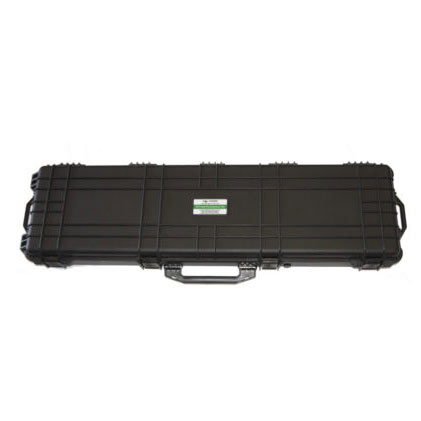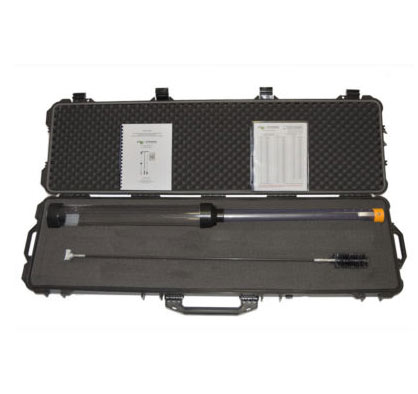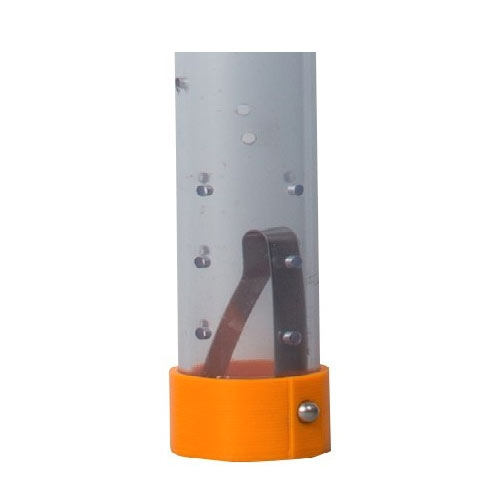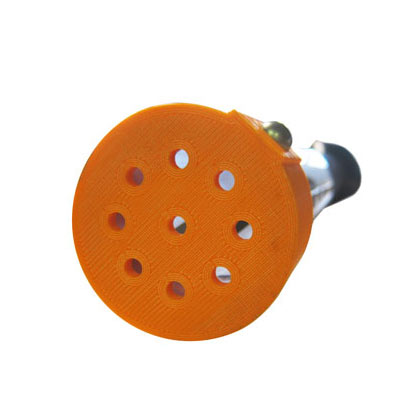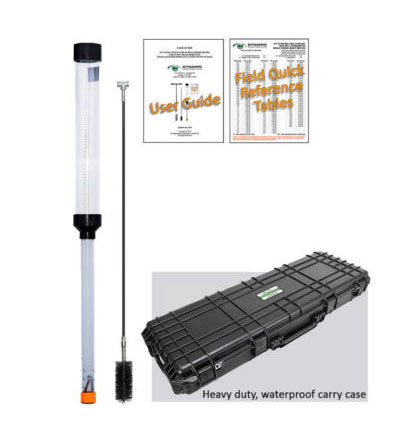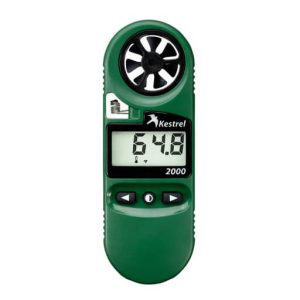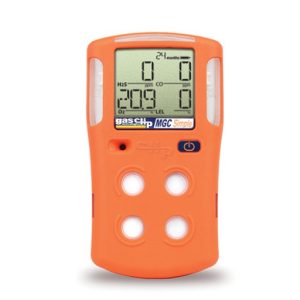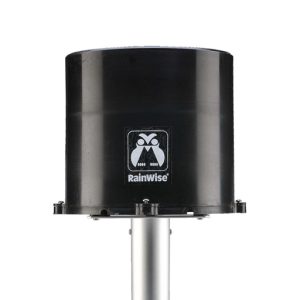The field-saturated hydraulic conductivity (Kfs) or permeability of in situ soil and constructed fill materials can be quickly and easily measured “in place” using the ETC Pask Constant Head Permeameter Kit.
Our kit is based on the peer-reviewed, Constant Head Well Permeameter method, described by Reynolds and Elrick, formerly of the University of Guelph, Canada. The ETC Pask Permeameter is a very convenient, and much less costly alternative to other types of in-situ parameters such as the Guelph Permeameter®. It is also a much more accurate and faster method of assessing the hydraulic capacity of soil than the outdated, and often very time-consuming, percolation test.
Our permeameter works with almost any soil type from loams and sands to clays, even built-up beds of imported septic fill or compacted clay liners for lagoons and landfills. They can also be used for the design of stormwater management systems. Our permeameter was recently recommended by Kimley-Horn (California, USA) for the assessment of large infiltration water quality BMPs to assess the BMP condition.
Features:
- Much more accurate and repeatable method of assessing the soil’s drainage properties than the percolation test.
- Unlike others, we use clear lightweight, and durable polycarbonate for the upper reservoir, rather than heavy PVC. This makes our permeameter extremely light, minimizing the potential for it to sink into the soil and cause errors.
- NEW! Our permeameter features a custom-designed ABS cap with a secure, stainless steel clip. No more concerns about losing rubber stoppers in the bottom of the well hole!
- Very fast – a test on most soils can usually be completed in only 15 to 45 minutes.
- A small amount of water is needed, typically 0.5 us gal (2 Liters) per test in medium permeability soils.
- Very visual; easy for homeowners and clients to see how it works, and whether they have “good” soil or not.
- A High-quality, durable soil auger (manufactured in the USA by industry leader AMS Samplers) helps to ensure the well hole is of the proper shape with a flat bottom.
- Calculations are made easy using ETC’s Quick Field Reference Tables.
- The well height created by the ETC Constant Head permeameter helps to minimize the impact of errors caused by improper soil characterization (estimation of α*).
Kit Includes:
- Hard-sided storage and carry case
- ETC Pask Permeameter with custom ABS cap and stainless steel clip
- AMS Professional Series, Two-piece, Riverside auger, nominal auger diameter 2 ¾”
- Custom twisted wire brush
- ETC Quick Reference Field Calculation Tables (based on an assumed well hole size of 3 ¼” (8.3cm)
- Pask Permeameter User Guide
They can also be used for the design of stormwater management systems. Our permeameter was recently recommended by Kimley-Horn (California, USA) for the assessment of large infiltration water quality BMPs to assess the BMP condition. Note: this is the same Permeameter that is included in our ETC Pask Permeameter Kit. If you intend to also purchase a soil auger, it is less expensive to purchase our complete kit rather than buying the components individually.
Complies with ASTM D5126, Standard Guide for Comparison of Field Methods for Determining Hydraulic Conductivity in Vadose Zone. Parameters of custom lengths or well heights are available for an additional charge. Contact us for details. The AMS Professional Series two-piece Riverside soil auger included in the kit is used to prepare the well hole. The shape of the blades is ideally suited to achieve a uniform diameter, flat-bottom well hole, which is assumed in the CHWP theory and calculations. The auger produces an average well hole of 3 ¼” = 8.3cm diameter. These AMS augers have been beefed up from “bit to bail” and are perfect for those who want a strong, durable auger that will stand up to wear and tear of daily use. They have a stainless steel cylinder, and carbon steel bail, shaft and T-handle. The auger features heat-treated, 11 gauge, high-carbon steel bits with stronger welds and extra tungsten carbide hard-surfaced edges. These Professional series augers are also reinforced with extra gussets welded at both the top and bottom of the bail. The gussets help prevent the bail from bending or twisting when augering into hard or rocky soils.
Auger dimensions: 127.5cm (50″) x 43cm (17″) x nominal auger diameter 2 ¾”
Auger weight: Approx. 5 lbs.
Note: Soil or fill containing abundant large gravel, cobbles, or boulders may not be feasible to test using this, or any other type of Constant Head Permeameter.
Our permeameter and the mathematical solution that the calculation of Kfs is based on (Reynolds et al.) complies with: ASTM D5126-16e1, Standard Guide for Comparison of Field Methods for Determining Hydraulic Conductivity in Vadose Zone. With regard to recognized standards in Canada, our permeameter and the mathematical solution were referenced in the CAN CSA B65-12 Standard Installation code for decentralized wastewater systems (refer to Annex E).
| Weight | 34 lbs |
|---|---|
| Dimensions | 53 × 17 × 7 in |
| Use to determine: | Field saturated hydraulic conductivity (Kfs) of in situ soil, prepared fill materials and constructed soil liners. |
| Applicable Permeability Range: | Approximately 0.3mm/day (eg. heavy clay) to 70,000mm/day (eg. coarse sand) |
| Typical Soil Types: | USDA/CSSC: Clay through to sand., USCS: Sand, silty sand, silt, clay. |
| Soils with high silt/clay content? | Yes. |
| Method of testing imported fill materials: | Auger well hole into a raised bed or test pad of imported fill of appropriate density. |
| Method of testing natural (in situ) soil: | Auger well hole into soil stratum to be tested. |
| Test soil with abundant gravel, cobbles, or boulders? | Generally, no, possible if gravel particles are small. |
| Theory and calculations based on: | Elrick and Reynolds, (1985, 1992). |
| Comes with: | ETC Pask Permeameter, User guide, Quick reference field calculation tables |
| Product dimensions: | Permeameter – 1250mm (49.2″) x 90mm (3.5″) nominal O.D. (upper reservoir) |
For more information, please see Instruction Manual
The field-saturated hydraulic conductivity (Kfs) or permeability of in situ soil and constructed fill materials can be quickly and easily measured “in place” using the ETC Pask Constant Head Permeameter Kit.
Our kit is based on the peer-reviewed, Constant Head Well Permeameter method, described by Reynolds and Elrick, formerly of the University of Guelph, Canada. The ETC Pask Permeameter is a very convenient, and much less costly alternative to other types of in-situ parameters such as the Guelph Permeameter®. It is also a much more accurate and faster method of assessing the hydraulic capacity of soil than the outdated, and often very time-consuming, percolation test.
Our permeameter works with almost any soil type from loams and sands to clays, even built-up beds of imported septic fill or compacted clay liners for lagoons and landfills. They can also be used for the design of stormwater management systems. Our permeameter was recently recommended by Kimley-Horn (California, USA) for the assessment of large infiltration water quality BMPs to assess the BMP condition.
Features:
- Much more accurate and repeatable method of assessing the soil’s drainage properties than the percolation test.
- Unlike others, we use clear lightweight, and durable polycarbonate for the upper reservoir, rather than heavy PVC. This makes our permeameter extremely light, minimizing the potential for it to sink into the soil and cause errors.
- NEW! Our permeameter features a custom-designed ABS cap with a secure, stainless steel clip. No more concerns about losing rubber stoppers in the bottom of the well hole!
- Very fast – a test on most soils can usually be completed in only 15 to 45 minutes.
- A small amount of water is needed, typically 0.5 us gal (2 Liters) per test in medium permeability soils.
- Very visual; easy for homeowners and clients to see how it works, and whether they have “good” soil or not.
- A High-quality, durable soil auger (manufactured in the USA by industry leader AMS Samplers) helps to ensure the well hole is of the proper shape with a flat bottom.
- Calculations are made easy using ETC’s Quick Field Reference Tables.
- The well height created by the ETC Constant Head permeameter helps to minimize the impact of errors caused by improper soil characterization (estimation of α*).
Kit Includes:
- Hard-sided storage and carry case
- ETC Pask Permeameter with custom ABS cap and stainless steel clip
- AMS Professional Series, Two-piece, Riverside auger, nominal auger diameter 2 ¾”
- Custom twisted wire brush
- ETC Quick Reference Field Calculation Tables (based on an assumed well hole size of 3 ¼” (8.3cm)
- Pask Permeameter User Guide
They can also be used for the design of stormwater management systems. Our permeameter was recently recommended by Kimley-Horn (California, USA) for the assessment of large infiltration water quality BMPs to assess the BMP condition. Note: this is the same Permeameter that is included in our ETC Pask Permeameter Kit. If you intend to also purchase a soil auger, it is less expensive to purchase our complete kit rather than buying the components individually.
Complies with ASTM D5126, Standard Guide for Comparison of Field Methods for Determining Hydraulic Conductivity in Vadose Zone. Parameters of custom lengths or well heights are available for an additional charge. Contact us for details. The AMS Professional Series two-piece Riverside soil auger included in the kit is used to prepare the well hole. The shape of the blades is ideally suited to achieve a uniform diameter, flat-bottom well hole, which is assumed in the CHWP theory and calculations. The auger produces an average well hole of 3 ¼” = 8.3cm diameter. These AMS augers have been beefed up from “bit to bail” and are perfect for those who want a strong, durable auger that will stand up to wear and tear of daily use. They have a stainless steel cylinder, and carbon steel bail, shaft and T-handle. The auger features heat-treated, 11 gauge, high-carbon steel bits with stronger welds and extra tungsten carbide hard-surfaced edges. These Professional series augers are also reinforced with extra gussets welded at both the top and bottom of the bail. The gussets help prevent the bail from bending or twisting when augering into hard or rocky soils.
Auger dimensions: 127.5cm (50″) x 43cm (17″) x nominal auger diameter 2 ¾”
Auger weight: Approx. 5 lbs.
Note: Soil or fill containing abundant large gravel, cobbles, or boulders may not be feasible to test using this, or any other type of Constant Head Permeameter.
Our permeameter and the mathematical solution that the calculation of Kfs is based on (Reynolds et al.) complies with: ASTM D5126-16e1, Standard Guide for Comparison of Field Methods for Determining Hydraulic Conductivity in Vadose Zone. With regard to recognized standards in Canada, our permeameter and the mathematical solution were referenced in the CAN CSA B65-12 Standard Installation code for decentralized wastewater systems (refer to Annex E).
| Weight | 34 lbs |
|---|---|
| Dimensions | 53 × 17 × 7 in |
| Use to determine: | Field saturated hydraulic conductivity (Kfs) of in situ soil, prepared fill materials and constructed soil liners. |
| Applicable Permeability Range: | Approximately 0.3mm/day (eg. heavy clay) to 70,000mm/day (eg. coarse sand) |
| Typical Soil Types: | USDA/CSSC: Clay through to sand., USCS: Sand, silty sand, silt, clay. |
| Soils with high silt/clay content? | Yes. |
| Method of testing imported fill materials: | Auger well hole into a raised bed or test pad of imported fill of appropriate density. |
| Method of testing natural (in situ) soil: | Auger well hole into soil stratum to be tested. |
| Test soil with abundant gravel, cobbles, or boulders? | Generally, no, possible if gravel particles are small. |
| Theory and calculations based on: | Elrick and Reynolds, (1985, 1992). |
| Comes with: | ETC Pask Permeameter, User guide, Quick reference field calculation tables |
| Product dimensions: | Permeameter – 1250mm (49.2″) x 90mm (3.5″) nominal O.D. (upper reservoir) |
For more information, please see Instruction Manual





